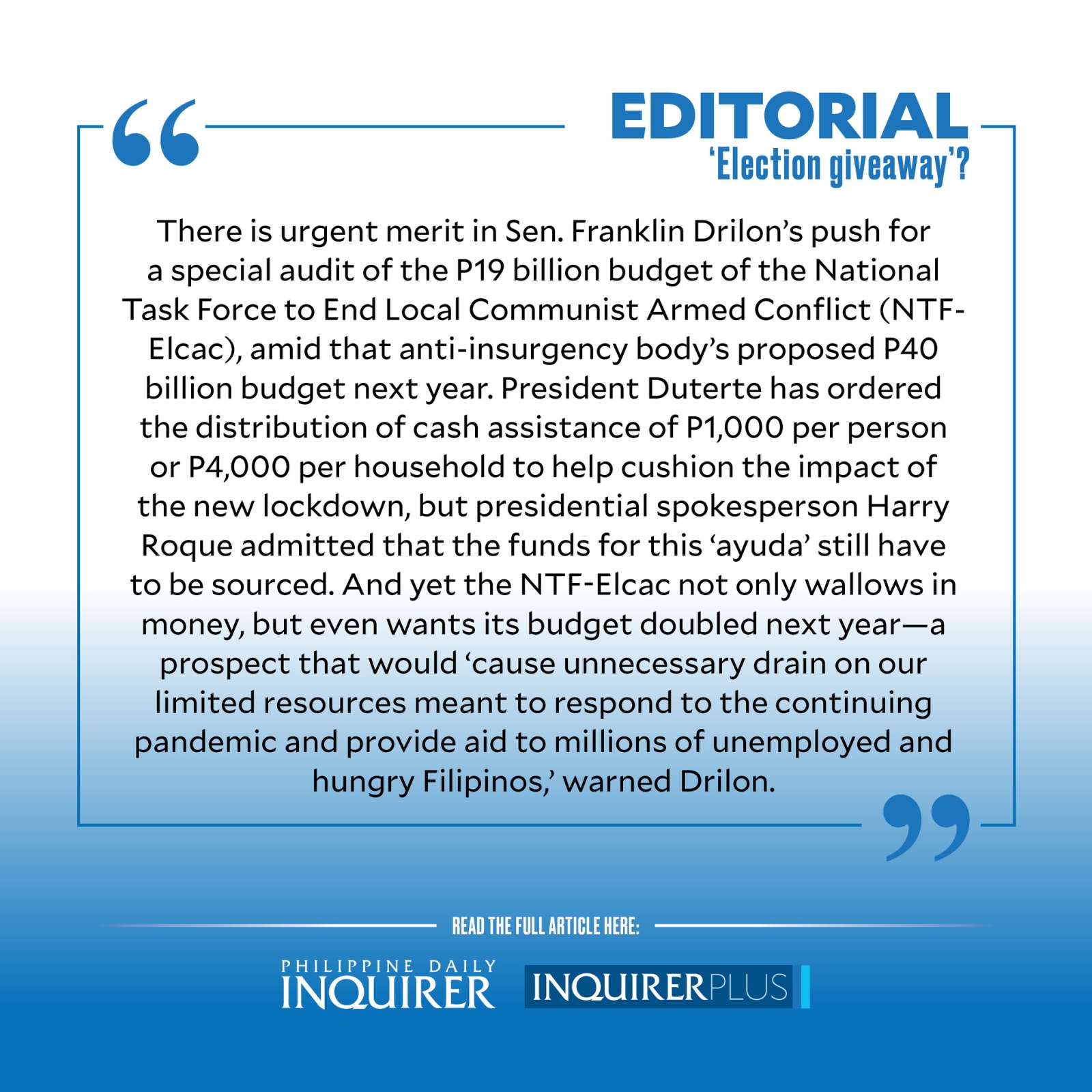
There is urgent merit in Sen. Franklin Drilon’s push for a special audit of the P19 billion budget of the National Task Force to End Local Communist Armed Conflict (NTF-Elcac), amid that anti-insurgency body’s proposed P40 billion budget next year.
With Metro Manila and other areas under enhanced community quarantine (ECQ) for two weeks starting today in an effort to contain the Delta variant of the COVID-19 virus, Drilon’s call for the fair and rational use of scarce government funds resonates with many Filipinos’ struggle for survival as the pandemic grinds on. President Duterte has ordered the distribution of cash assistance of P1,000 per person or P4,000 per household to help cushion the impact of the new lockdown, but presidential spokesperson Harry Roque admitted that the funds for this “ayuda” still have to be sourced.
And yet the NTF-Elcac not only wallows in money, but even wants its budget doubled next year—a prospect that would “cause unnecessary drain on our limited resources meant to respond to the continuing pandemic and provide aid to millions of unemployed and hungry Filipinos,” warned Drilon.
At least 167,000 workers in Metro Manila would be affected by the ECQ, according to the Department of Labor and Employment. The figure includes about 40,000 workers who risk being laid off and another 127,000 whose pay could be further reduced.
To make matters worse, Lt. Gen. Ephraim Dickson, Joint Task Force COVID Shield commander, has disallowed the partaking of goods from community pantries during ECQ, unless an individual is considered an APOR (authorized person outside of residence), thus effectively shutting down private efforts to help out during the lockdown.
The ban has been described as “inhumane” by Defend Jobs Philippines, a labor group and community pantry organizer, which urged the government to keep planned humanitarian initiatives free from restrictions under ECQ. “Our people are still relying on each other’s support mechanism to survive this crisis,” said the group’s spokesperson Christian Lloyd Magsoy.
The special audit of NTF-Elcac funds should, in particular, look into the P16.3 billion the task force allotted for projects that, Drilon contended, are “often [a] source of corruption,” much like the fertilizer scam and the Tesda “ghost scholars” under the Arroyo administration.
The Senate Minority Leader questioned why the bulk of the supposed Barangay Development Program funds for various projects, including 926 farm-to-market roads, 516 water and sanitation projects, 156 health stations, and 135 school buildings, ended up in President Duterte’s home region of Davao and his hometown of Davao City, which have received P4.3 billion and P1.64 billion, respectively. Were the funds meant as “an election giveaway… designed to woo voters” in the 2022 polls? Drilon asked.
In May, the senator had sounded the alarm over what he called the hurried release of P10.68 billion in funds to the task force, with over P7 billion released in April despite calls from lawmakers to have the NTF-Elcac’s budget realigned to the government’s pandemic response. Another P3.14 billion was released on March 24. In all, P16.3 billion was released “to the last centavo” in just four months from March, of which P4 billion, or a fourth of the funds, went to the Davao region.
On the other hand, while ordinary Filipinos grapple with severely limited means, the Philippine National Police’s budget for anti-insurgency remains largely untouched. A recent government audit showed that the PNP had utilized only about 12 percent of its huge counter-insurgency budget of P722.95 million for 2020.
The Commission on Audit finding is “proof that we do not need to give a single centavo to the NTF-Elcac for 2022,” declared Drilon. “We have more than sufficient funds to counter insurgency, millions of which remained untouched, unobligated, and unspent.”
The warped priorities and the lack of transparency in spending taxpayer money compound the government’s lamentable response to the pandemic. While it thinks nothing of allocating P40 billion to a flashy anti-insurgency body that has been accused of reckless Red-tagging, the administration has failed to fund crucial expenses—like the hiring of more contact tracers and extending their contracts, pandemic requisites that contact tracing czar and Baguio City mayor Benjamin Magalong said have been stymied by lack of funds.
“Wala pa pong pondo para sa renewal ng ating contact tracers,” Magalong disclosed Wednesday during a House briefing on the COVID-19 situation in the country. The Department of the Interior and Local Government said it was asking for P5 billion to P7 billion from the existing national budget to hire more contact tracers. Think of that: not even half of the P19 billion anti-insurgency budget, and what a difference it would have made in these harrowing times.